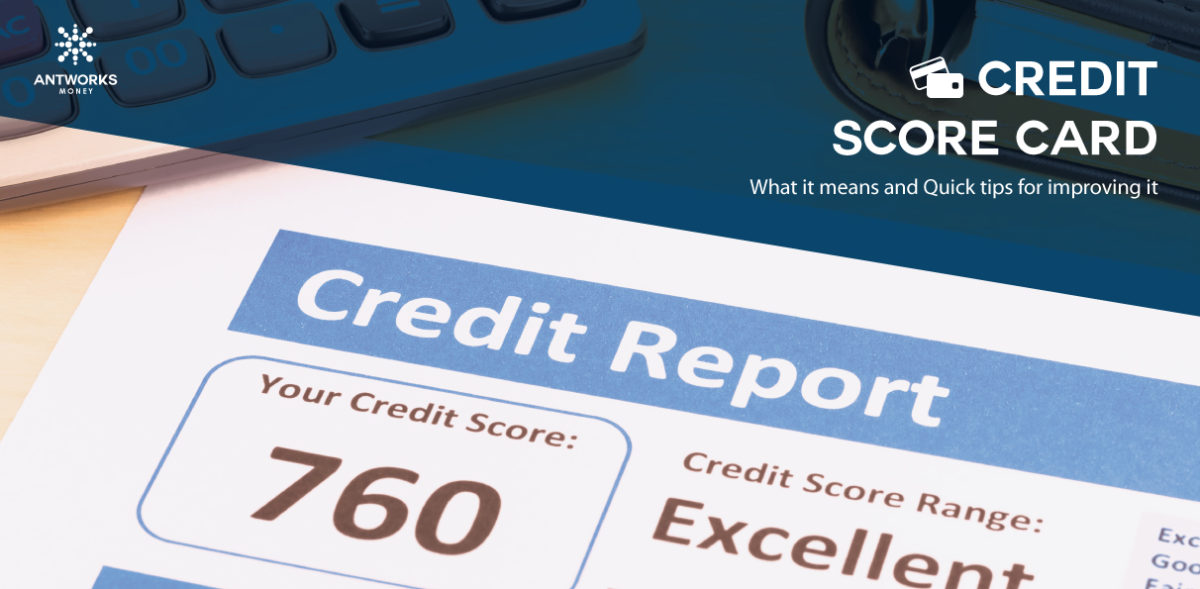Ignorantia juris non excusat or ignorantia legis neminem excusat (Latin for “ignorance of the law excuses not and “ignorance of law excuses no one respectively) is a legal principle holding that a person who is unaware of a law may not escape liability for violating that law merely because he or she was unaware of its content.
In the same way, ignorance about your credit score does not mean that you will be given benefit of doubt at time of appraisal of credit facilities by banks. With advent of technology, Information is available to Banks on Real time basis. Therefore, knowing your Credit score and managing it like a hawk is of paramount importance. Sadly, most of the people are not even aware about credit scoring and how it work.
What is Credit score?
The application of statistical methods to credit data with the intent of predicting the likelihood of some credit-related event taking place.
- Makes use of credit history information
- Developed using “analytically derived, demonstrably and statistically sound” statistical techniques
A credit score does not tell how an individual will act. Rather, it tells the probability or likelihood that the individual will act a certain way
While developing a credit scoring model, credit bureaus like CIBIL Transunion, Experian, Equifax and CRIF Highmarks generally factor in following:
- Payment History of Individual or Business and whether there has there been delinquency in the recent or historical past?
- Length of Credit History – A longer history equates to stability and often more credit information.
- Amount Owed- What are the aggregate balances owed by Individual or Business and how high is the credit utilization (balances as a percent of available credit)?
- Types of Credit in Use – Does the consumer have a healthy mix of credit devices?
- New Credit – Has the Individual or Business escalated their use of credit?
Different credit scores and their significance:
Lenders are wary of extending credit to borrowers with a credit score of 650 or lower for loans like home loans. Lenders prefer a credit score of 750 and above for unsecured loans like a consumer loan. Below table explains significance of different range of credit scores for your Credit health:
Credit Score Range /CIBIL score
What does it mean? What are its implications?
750-900
Excellent credit score indicative of consistent and default free record of past repayments. Individual with credit score in this range will likely get loans at competitive rates of interest from most banks. Secured loans (home loan, car loan, business loan) as well as unsecured loans (personal loan, credit card) will be easily available subject to sufficient Borrowing capacity.
650-750
Fairly good credit score which reflects fair loan repayment in the past Individual is likely to get loans at competitive rates from most banks. Depending on eligibility, Individual will receive secured loans (home, card loan) fairly easily however for unsecured loans (personal, credit card), banks might conduct further analysis for reasons of lower credit score. Sometimes, factors like Multiple banks making a credit enquiry for same requirement and/or lack of knowledge on part of consumer results in lower credit score.
550-650
Low score indicative of delays or irregularities in repayments in the past Lenders will avoid granting a loan, unless a significant credit check has been done. Also consumer may have to pay a higher rate of interest and Banks most likely will approve loans but at low LTV and high collateral
300-500
Very low score, indicatives of over leverage or many irregularities in repayments An individual with credit score in this range will find it Very difficult to obtain a loan from established financial institutions and Creditors. P2P platforms are a good option for such Individuals however a thorough due diligence is required to be done by Platform for reasons of low credit score and price the loans according to Risk.
How to manage your credit Score:
Not only does a good score improve our chances of getting a loan/credit, but also helps us get a better interest rates. Most often people are taken aback by the fact that they have a bad score and wonder how to improve credit or CIBIL scores quickly or immediately. However, please remember that there are no quick fixes for a low credit score and it takes times and effort to improve the Credit score. Here are some ways by which you can get your scores up.
- Check your score regularly:
-
- Keep a check to see where you stand and how much your score has increased by obtaining your credit report at least 2 or 3 times a year.
Quick tips: you can get free credit score once a year from Antworksmoney.com. We have tied up with Experian to provide users with free Credit scores on real time basis
- Improve payment track record on existing debt:
-
- Make timely payments on current debt.
- Ensure outstanding dues are paid off in full.
Quick tips: Provide standing instructions to have dues debited automatically from your account. This will reduce chances of missing payments.
- Use credit in a wise manner:
-
- Always use credit wisely and don’t over-leverage yourself
Quick tips: Try to use up to 75% of your approved credit limit on your credit cards. This will indicate calculated spending which is a positive thing.
- Stop applying for fresh credit:
-
- As soon as you find out you have a poor credit score, do not apply at another bank for a loan right away.
- The more inquiries a lender puts in to CIBIL about your score, the lower it goes.
Quick tips: Obtain your credit score yourself. This will be considered a soft inquiry and can be used for new applications without creating a negative impact.
- Manage your debt properly:
-
- Use more of secured loans.
- If you must have unsecured loans, ensure it’s kept to a minimum. A higher amount of unsecured debt indicates a need for funds for personal purposes and a lower credit score.
Quick tips: try to consolidate loans, it will be easier to track payments thereby reducing the chance of a missed payment. Also you can get a better deal by consolidating loan most of the times making it more affordable.
- Check for discrepancies in your credit report:
-
- Sometimes, a member bank or financial institution sends across incorrect information to Credit Bureaus. If this is the case, you can approach the said bank or institution and have them correct this.
Quick tips: Ensure all data on positive and timely payments are recorded and submitted by your lender to Credit Bureaus as it will have very positive impact on Credit score
Use Professional Credit Counselling Services:
Quick Tips: The good news is that, professional help us available to Individuals who want to improve their credit score. At Antworks Money, one of our primary offering for our esteemed users is Credit Counselling Services. We can help you in your efforts to improve your credit score by providing you following services:
-
- Free Credit score from Experian
- A thorough analysis of your Credit Score Card
- If there are any discrepancies in the Credit Score Card, we guide you how to take up the matter with Banks
- Provide you action plan for improvement in your credit score over a period of time
Increasing your Credit Score is not an easy task, even if not impossible. One needs to follow a patient and disciplined approach and watch their Credit Score like a Hawk.
Visit here for more updates: @AntworksMoney






